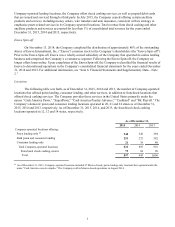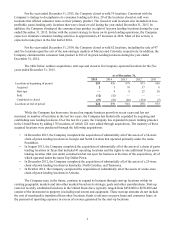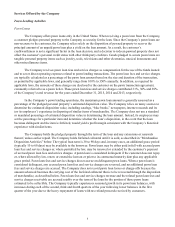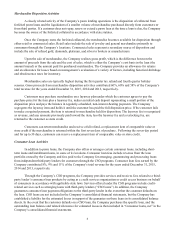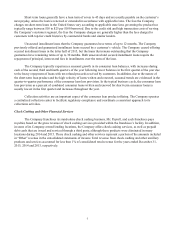Cash America 2015 Annual Report Download - page 17
Download and view the complete annual report
Please find page 17 of the 2015 Cash America annual report below. You can navigate through the pages in the report by either clicking on the pages listed below, or by using the keyword search tool below to find specific information within the annual report.
confidentiality of consumers’ nonpublic personal information. These regulations also dictate certain actions that it
must take to notify consumers if their personal information is disclosed in an unauthorized manner.
Anti-Money Laundering and Economic Sanctions. The Company is also subject to certain provisions of the
USA PATRIOT Act and the Bank Secrecy Act under which the Company must maintain an anti-money laundering
compliance program covering certain of its business activities. In addition, the Office of Foreign Assets Control
prohibits the Company from engaging in financial transactions with specially designated nationals. Certain of the
Company’s subsidiaries are also registered as money services businesses with the U.S. Treasury Department and
must re-register with the Treasury Department’s Financial Crimes Enforcement Network at least every two years.
Firearms. Each pawn lending location that handles firearms must comply with the Brady Handgun
Violence Prevention Act, which requires that federally licensed firearms dealers conduct a background check in
connection with any disposition of handguns. In addition, the Company must comply with the regulations of the
U.S. Department of Justice-Bureau of Alcohol, Tobacco and Firearms that require each pawn lending location
dealing in guns to maintain a permanent written record of all receipts and dispositions of firearms.
CFPB. In July 2010, the U.S. Congress passed the Dodd-Frank Wall Street Reform and Consumer
Protection Act of 2010 (the “Dodd-Frank Act”), and Title X of the Dodd-Frank Act created the Consumer Financial
Protection Bureau (the “CFPB”), which regulates consumer financial products and services, including consumer
loans offered by the Company. The CFPB has regulatory, supervisory and enforcement powers over providers of
consumer financial products and services, including providers of consumer loans such as the Company, and has the
authority to examine and require registration of such providers.
The CFPB has been conducting a review of the short-term small dollar loan industry, which includes a
review of payday loans, and has indicated that its “findings raised substantial consumer protection concerns” related
tothesustaineduseofpaydayloans.OnMarch26,2015,theCFPBannouncedthatitisconsideringproposing
rules that would require lenders to take steps to make sure consumers can repay their loans and would also restrict
lenders from attempting to “collect payment from a consumers’ bank account in ways that tend to rack up excessive
fees.” The CFPB has indicated that such rules would apply to payday loans, vehicle title loans and high-cost
installment loans, among other consumer loans, and may impose certain limitations on these types of loans, such as
requiring additional underwriting requirements, requiring cooling-off periods between payday loans, limitations on
loan amounts and terms and limitations to prevent the sustained use of certain loans, among other things. The CFPB
has also indicated that the rules that are proposed may also place restrictions on collection practices with respect to
these types of loans. All of the Company’s consumer loan products and certain pawn loans offered by the Company
that are collateralized by a customer’s vehicle or the title thereto could be affected by such rules if they are
applicable to the types of loans that the CFPB has indicated when they are adopted. If the CFPB adopts any such
rules or regulations, it could reduce revenue from these products or make the continuance of these products
impractical or unprofitable. The Company does not currently know the nature and extent of the rules the CFPB will
adopt, but those rules could be proposed during 2016 and, if adopted, would likely become effective in 2017.
OnNovember20,2013,theCompanyconsentedtotheissuanceofaConsentOrderbytheCFPBpursuant
to which it agreed, without admitting or denying any of the facts or conclusions made by the CFPB from its 2012
review of the Company,topayacivilmoneypenaltyof$5million.The Company is subject to the restrictions and
obligations of the Consent Order, including the CFPB’s order that the Company ensure compliance with federal
consumer financial laws and have more robust compliance policies and procedures. Furthermore, the compliance
plan mandated by the Consent Order requires the Company to perform a formal consumer protection compliance
risk review before introducing or implementing new or changed products or services, which could result in
additional delay or cost when introducing or implementing new or changed products or services, or a decision not to
proceed with such initiatives.
For further discussion of the CFPB and its regulatory, supervisory and enforcement powers or the Consent
Order, see “Item 1A. Risk Factors—Risks Related to the Company’s Business and Industry—The CFPB has
regulatory, supervisory and enforcement powers over providers of consumer financial products and services, and it
13


